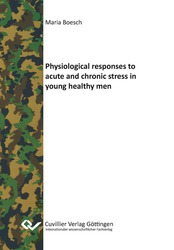| Fachbereiche | |
|---|---|
| Buchreihen (97) |
1382
|
| Nachhaltigkeit |
3
|
| Gesundheitswesen |
1
|
| Geisteswissenschaften |
2376
|
| Medienwissenschaften | 16 |
| Theologie | 57 |
| Philosophie | 102 |
| Rechtswissenschaft | 424 |
| Wirtschaftswissenschaften | 855 |
| Sozialwissenschaften | 417 |
| Sportwissenschaften | 48 |
| Psychologie | 233 |
| Pädagogik | 190 |
| Geschichtswissenschaften | 183 |
| Kunstwissenschaften | 111 |
| Kulturwissenschaften | 166 |
| Literaturwissenschaften | 117 |
| Sprachwissenschaften | 89 |
| Naturwissenschaften |
5408
|
| Ingenieurwissenschaften |
1798
|
| Allgemein |
98
|
|
Leitlinien Unfallchirurgie
5. Auflage bestellen |
|
Erweiterte Suche
Physiological responses to acute and chronic stress in young healthy men
Maria Bösch (Autor)Vorschau
Inhaltsverzeichnis, PDF (37 KB)
Leseprobe, PDF (19 KB)
The purpose of the present thesis was two studies. The goal of the first study was to evaluate the efficiency of the Trier Social Stress Test for Groups (TSST-G) and its ability to repeatedly evoke an affective and autonomic stress response by means of two different protocols in a second measurement. The aim of the second study was to investigate the effect of prolonged mental and physical stress induced by basic military training (BMT) on hair cortisol concentration (HCC), while further exploring the role of covariates. Healthy young recruits participated twice, 10 weeks apart. In the first examination, the TSST-G consisted of a combination of mental arithmetic and a fake job interview (n = 294). Additionally, participants had to give a 2-cm hair sample and had to complete the Perceived Stress Questionnaire (PSQ; n = 177). In the second examination, mental arithmetic was combined with either (a) a defence speech against a false accusation of shoplifting (n = 105), or (b) a presentation on a given topic (n = 100). Participants had to give a hair sample again and fill out the PSQ (n = 105). Affect ratings and salivary alpha-amylase (sAA) were assessed immediately before and after the TSST-G, while heart rate (HR) and heart rate variability (HRV) were measured continuously. The findings of the first study revealed that the TSST-G is a useful protocol to repeatedly evoke an affective and autonomic stress response, even though repetition leads to habituation, mainly in affective variables. When interested in efficacy to induce a stress response, a task containing a defence speech seems to be superior to a task containing a presentation on an impersonal topic, which is probably due a higher ego-involvement in the defence speech. The results of the second study revealed a significant influence of air temperature, humidity, and educational level on HCC. Military stress and perceived stress ratings did not influence HCC. This study is the first to examine the relationship between HCC and meteorological variables, as well as the first research evaluating the effect of military training as a real-life stressor on the HCC of the recruits. The two studies contribute to stress research by evaluating an instrument for inducing stress in a military setting and by using an innovative method of measurement.
| ISBN-13 (Printausgabe) | 9783954047178 |
| ISBN-13 (E-Book) | 9783736947177 |
| Buchendformat | A5 |
| Sprache | Englisch |
| Seitenanzahl | 138 |
| Umschlagkaschierung | matt |
| Auflage | 1. Aufl. |
| Erscheinungsort | Göttingen |
| Promotionsort | Zürich |
| Erscheinungsdatum | 21.05.2014 |
| Allgemeine Einordnung | Dissertation |
| Fachbereiche |
Psychologie
|
| Schlagwörter | repeated stress, stress, autonimoc nervous system, heart rate, hair cortisol, basic military training, heart rate variability |








